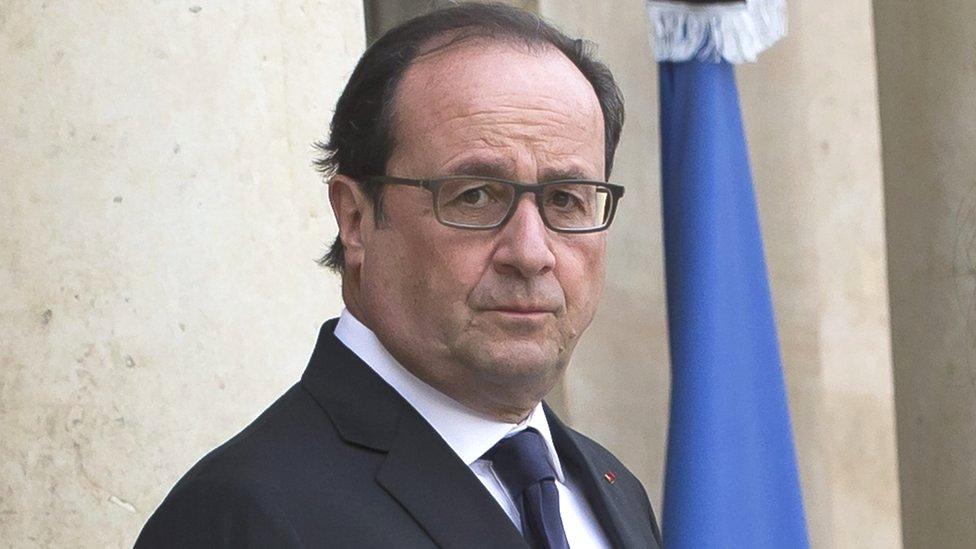French politics shifts right after Paris attacks
- Published
- comments
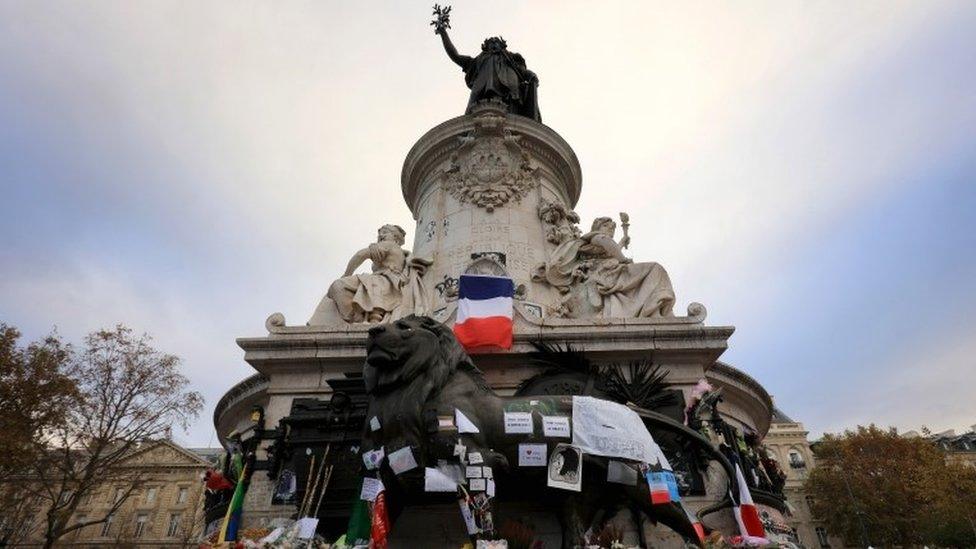
Many people have left tributes at the statue of Marianne in the Place de la Republique
Marianne, the imposing woman who represents the French Republic, looms above the crowd, holding in one hand an olive branch, in the other a book, marked: "Human rights".
Not perhaps the most appropriate symbols of this moment in the Republic's history.
Below her statue in the Place de la Republique, candles and flowers lie in tribute, after the attacks that have shaken this country to the core.
The hard-line response of President Francois Hollande might suggest he'd like to see her instead holding an assault rifle and a ledger of new laws.
French politics is in a state of flux. How he and others respond to the enormous challenge posed by mass murder is likely to dictate how France, and maybe Europe, changes over the next few months and years.
The mood in Paris after the slaughter at Charlie Hebdo, external and in the Jewish supermarket was one of defiant solidarity with those who were targeted. "We are all Charlie," was the sentiment.
The attacks on Friday night, on a rock concert, a football match, on people eating and drinking, had a different meaning. "We're all targets," is nearer the mood this time. Not a declaration of faith but a realisation of vulnerability.
It is a moment when people look to their politicians for solutions.
'Destroy radical Islam'
But to this president? Mr Hollande has the worst opinion poll ratings of any French president ever. In early October one, external put his approval rating at just 17%.
It had risen to the dizzying heights of 22% shortly after his tough response to the Charlie Hebdo murders. Another poll, slightly later last month, suggested, external his unpopularity was growing.
So it is little surprise that the notion of solidarity only lasted a few hours and his rivals were uncompromising.
The leader of the Front National (FN), Marine Le Pen, did suspend her campaign for the regional elections (the party is expected to do very well, external in the North and South West), but she called for France to rearm, take back control of its borders, and destroy radical Islam.
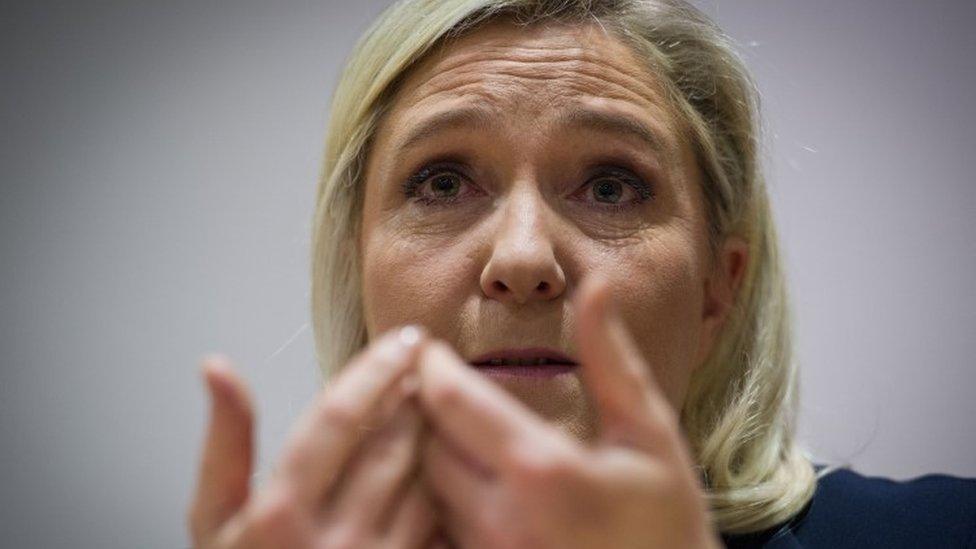
Front National leader Marine Le Pen is eyeing regional elections in December

Front National
1972: Founded by former soldier and far-right politician Jean-Marie Le Pen, external. Stakes out strongly nationalist, economically protectionist, anti-immigration agenda in following years.
1987: Mr Le Pen first makes public comments calling the Nazi Holocaust a "detail of history". He is subsequently convicted several times of racism or inciting racial hatred
2002: FN causes an earthquake in French politics when Mr Le Pen beats socialist candidate Lionel Jospin in presidential elections to reach a run-off against Jacques Chirac
2011: Marine Le Pen succeeds her father as FN leader, tries to "detoxify" the party brand, distance it from accusations of anti-semitism. Critics say the party's focus simply switched to Muslims
2012: Comes third in presidential elections, with 17.9% of the vote
2015: Ms Le Pen is charged with inciting racial hatred for comments about Muslims praying in the street. Her trial came weeks before local elections, due in December, in which the FN's anti-immigration and anti-EU message is expected to play well

Former president Nicolas Sarkozy, leader of the UMP, recently renamed, external the Republicans, called for a new European immigration policy, external, beefed-up security and a fresh foreign policy. So much for national unity.
It is hardly surprising that the president, often portrayed as flabby and weak, has announced, external a raft of draconian measures, endorsing, rather than diminishing the sense of national crisis.
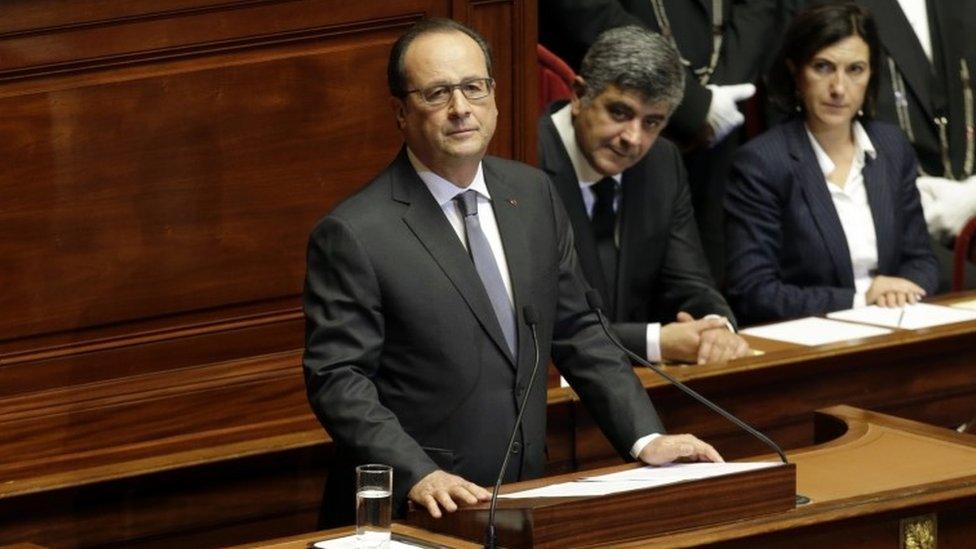
President Hollande announced a series of hard-line measures
He wants to change the constitution to allow a continued state of emergency - it's actually described as a "state of siege" in his speech - allowing French people to be stripped of their citizenship and barred from the country if they have a second nationality and are convicted of terrorism, to look again at when police can use deadly force, putting plans to cut defence spending on ice and recruiting 5,000 more officers.
Perhaps most importantly, the determination to destroy the Islamic State militant group is put above getting Syrian President Bashar al-Assad out of power.
If a rapprochement with the Russians was on the cards before, this strengthens President Vladimir Putin's hand and desirability as a partner.
It is hardly "Keep calm and carry on".
Riding the tiger
One foreign observer said:, external "Some of the ideas (some would say most of them) seem to come from the platforms of European right-wing parties, even the extreme right-wing."
The sense of a national emergency is no doubt fully justified, but riding the tiger of perpetual crisis is a dangerous gambit.
Some might argue it is exactly what the terrorists want - others that it is a bit late.
Indeed, that is exactly what Ms Le Pen is saying. She is a far more subtle, sophisticated politician than her father - undermining suspicions of her party with displays of considered reasonableness. Her tone now is, rather more in sadness than anger, "We told you so".
After Mr Hollande's speech, she said, external many of the measures were to be welcomed, and would be supported by the FN.
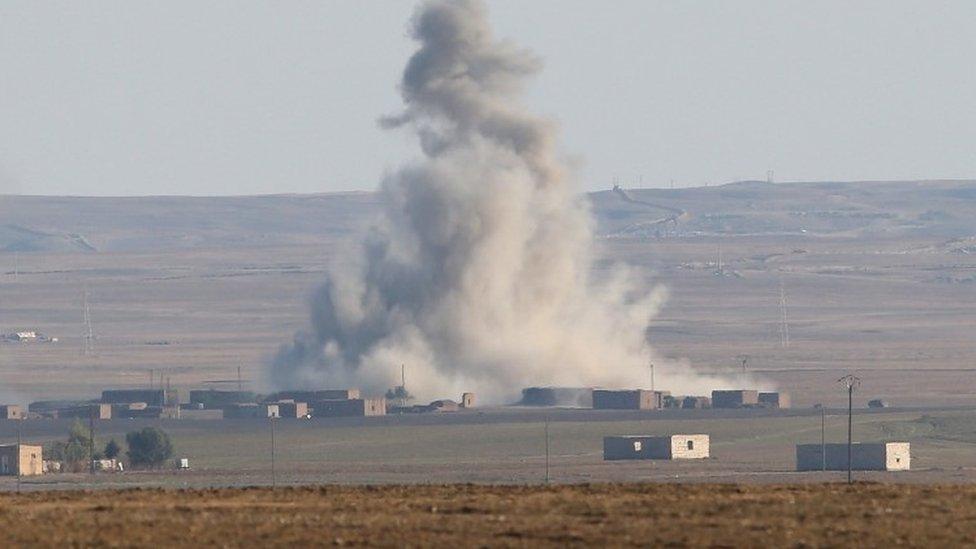
Destroying the Islamic State group has now risen up France's agenda in Syria
But she went on to say that Mr Hollande was still defending borders that leaked like a sieve, indulging in the "fad" of welcoming immigrants and refusing to fight against radical Islam and multiculturalism.
It is very hard to predict how this argument will fare in the coming elections. But the sense that this has been a long time coming may have heads nodding.
In my interview with Professor Andrew Hussey, he observed that for historical reasons parts of the South had become an FN fiefdom and the attacks might further the sense that Paris was a different country - almost that terrorism was a problem of the capital and it was best that it stayed there.
In that dreariest of reporter's phrases, only time will tell how these horrific murders affect the election, but they have already had a huge impact on the landscape - the unpopular left-wing president has shifted to the right with measures ranging from populist to simply hard line.
He has absorbed the key suggestions of his two rivals, which could neuter them and change his public image.
The French Republic, in its several incarnations, is no stranger to authoritarian reactions at critical moments - but it is harder than in most countries to predict whether this will satisfy the public mood, create a demand for even stronger measures or indeed, in this contrary nation, simply be seen as an offence against notions of liberty and fraternity.
- Published18 November 2015
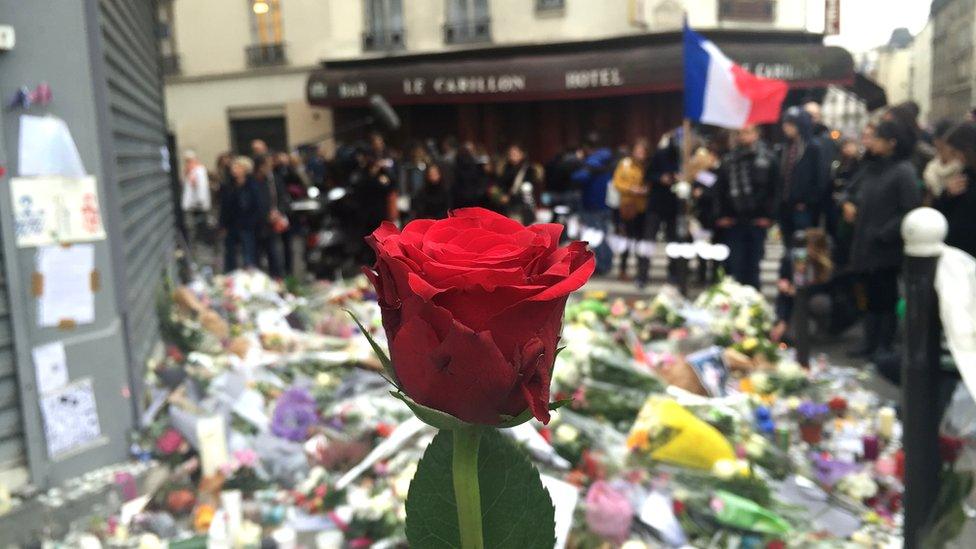
- Published18 November 2015
- Published17 November 2015
